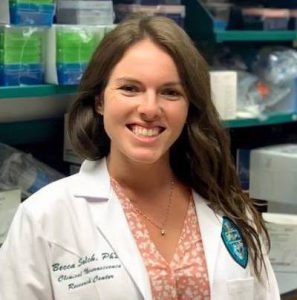 We are pleased to welcome our first alumni guest on the FSHN blog! Becca Solch graduated from the University of Florida with a Ph.D. in Nutritional Sciences under the mentorship of Dr. Bobbi Langkamp-Henken. She is from Belleview, FL and is proud to be a double Gator, attending UF for her undergraduate and graduate degrees. Read on to learn about her post-UF career in research, how the FSHN department shaped her academic journey, and the three foods she would want on a desert island!
We are pleased to welcome our first alumni guest on the FSHN blog! Becca Solch graduated from the University of Florida with a Ph.D. in Nutritional Sciences under the mentorship of Dr. Bobbi Langkamp-Henken. She is from Belleview, FL and is proud to be a double Gator, attending UF for her undergraduate and graduate degrees. Read on to learn about her post-UF career in research, how the FSHN department shaped her academic journey, and the three foods she would want on a desert island!
You graduated from UF last summer, and now you’re a postdoctoral researcher fellow at Tulane University! Would you tell me about your current research?
I am currently a postdoctoral research fellow in the Neurology department under Dr. Demetrius Maraganore (Chair of the Neurology Department, Herbert J. Harvey, Jr. Chair in Neurosciences, Co-director of the Tulane Center for Clinical neurosciences). Dr. Maraganore’s research interests surround the concept of healthy brain aging with a focus on preventing cognitive decline and dementia in at-risk individuals.
To do this we are focusing on modifiable lifestyle factors such as diet. Previous research has shown that the Mediterranean diet (MeDi) is associated with lower all-cause mortality and more recently, improving age-related cognitive decline. This diet contrasts the standard American diet by being rich in fruits, vegetables, nuts, extra virgin olive oil, cereals and pulses or legumes which provide substrates for our gut microbiota. Although the intestinal microbiota is complicated and we are continually learning more information about it, we believe that the link between the improved cognitive function and Mediterranean diet is modulated by the intestinal microbiota.
Choosing a committee chair/lab for your Ph.D. is a career altering choice. It not only sets up a foundation for your future interests, but it also develops your mentality as a researcher.
To explore the relationship between the MeDi, microbiota and cognitive function, I am working on both clinical and translational models. For the translational models, we are working with Dr. Gregory Bix (Vice Chair of Clinical & Translational Research) and Dr. Liz Engler-Chiurazzi (Assistant Professor). I split about half my time working on the clinical projects and developing skills in the lab to develop our protocols for the translational models. The translational side of research is a whole new world that I am excited to explore. I remember listening to seminars and the question always popped up about how rodent chow isn’t necessarily similar to what we eat as humans, now I get to model our rodent diets after human consumption (Western and Mediterranean) and see its effects on cognitive function!
How did you become interested in it?
During my Ph.D., my dissertation focused on the effects of probiotics on stress-associated gastrointestinal function in university students which introduced me to the concept of the gut-brain axis. While neurology was not a focus of my studies during my Ph.D., it is something that has always been intriguing to me. About two years ago, the Henken Lab partnered with the Norman Fixel Institute. Two of my previous lab mates work as registered dietitian nutritionists at the Institute and focus their doctoral research on nutrition and Parkinson’s disease. This partnership gave me some exposure to neurodegenerative diseases and nutrition.
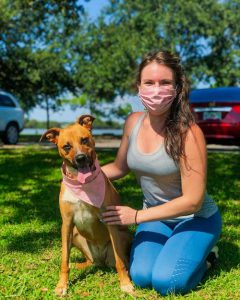
This postdoctoral opportunity is an incredible opportunity as its combines two of my research interests, nutrition and microbiota, to a new realm of clinical care. It is intimidating and challenging to transition to a new field, but my experience and training through the FSHN doctoral program prepared me well.
Would you share how you chose the Ph.D. in Nutritional Sciences program at UF?
This is one of my favorite questions to answer! In 2014, I applied to be a summer IFAS intern and was selected by Dr. Henken’s lab. This is where I go my first experience in the realm of clinical nutrition research. I was working on one of Dr. Burn’s dissertation clinical studies without knowing in a few short years she would be my lab mate, mentor and friend. At the time, I was on the pre-med track taking nutrition-focused classes. I continued to volunteer after the internship ended and developed skills as a research coordinator.
As I began taking higher-level courses, especially Nutrition and Metabolism and Nutrition and Disease I & II, I realized that I really enjoyed these classes and started to consider a different path. After graduating from the FSHN program in May 2016, I was hired as a full-time study coordinator in the Henken Lab. During this time, I managed a randomized, triple cross-over clinical study which was an incredible and challenging experience that solidified my decision to follow the path of nutrition research. In fall of that year, Dr. Henken offered a spot in her lab and I applied to start in the spring of 2017! Our lab is like a family, and by the time I officially joined, I already felt like a member.
Working as a full-time coordinator allowed me to see firsthand how students in the lab enjoyed their classes and imagine what my future would be like as a doctoral student. Without volunteering and working with the Henken Lab as an undergraduate, I would never been exposed to research and its related career opportunities.
How did the FSHN department shape your career?
This department has provided me with invaluable experience and knowledge through my lab work and my relationships with mentors. From professors to the front office to advising, the members of the department became like family. I miss them!
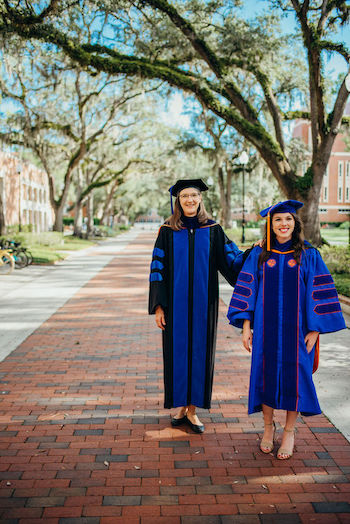
Choosing a committee chair/lab for your Ph.D. is a career altering choice. It not only sets up a foundation for your future interests, but it also develops your mentality as a researcher. In our lab, we worked as one big team which allowed for discussions on research topics outside the focus of my own research. Regardless of who was leading the study, we worked on it together (shout out to Dr. Jennifer Dennis-Wall, Dr. Alyssa Burns, Taylor, Caitlin, Carley and Matt), increasing our knowledge of clinical trials through collective experience. By the end of my doctoral career, I had worked on seven study protocols. Overall, Dr. Henken taught me how to be a leader and mentor to both undergraduate students and graduate students.
The FSHN department is always supportive of its students and their interests. For example, intestinal permeability and its relation to microbiota has become a hot area to study. We had the opportunity to conduct several studies assessing probiotic or fiber interventions on intestinal permeability. In addition, Dr. Archer’s Intestinal Permeability class was an invaluable introduction to research at the graduate level, and it facilitated fruitful discussions between professors and students in a discussion type environment.
Professors in this department are incredible mentors. Those I had the opportunity to work with in my committee (Dr. Percival, Dr. Matthews, Dr. Dahl and Dr. Roberts) or outside of it (Dr. Archer), were humble and encouraging. Studying with Dr. Henken helped me develop the skills needed to be an independent researcher in my postdoctoral position. Neurology and translational science (rodent models) is a new field to me, and the skills I learned throughout my doctoral career have enabled me to dive into this field with confidence.
I saw you were an American Society for Nutrition Emerging Leaders in Nutrition Science finalist! Congratulations! What was that like?
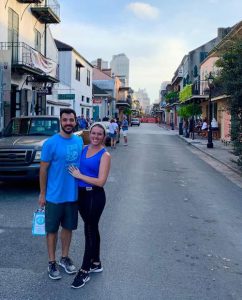
Thank you so much! This project focused on the fecal microbiome in stool samples I received from ~200 students during their baseline period of my dissertation. It was unique because it was such a large sample of young healthy adults, and many studies focus on different ages, diseased states and/or the analysis of fewer samples. It’s interesting how different factors (i.e., sex, fiber intake, stool consistency, stress and body mass index) can influence the composition of our gut microbiota even in healthy young adults. I was so excited to be selected as a finalist for this award!
What would you like to do after completing your postdoc?
This is always a hard question to answer! As I’m lucky to be getting experience in a whole new world of research (neurology and working with animal models) alongside the clinical research, I am exploring new opportunities. I would love to continue to bring awareness to the relationship between diet, microbiota and brain health. I hope to continue in academia after my postdoctoral position.
What do you like to do in your free time?
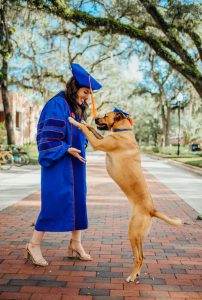
I love to spend time outside and being active. When I was back in Florida, I spent a lot of my free time riding horses. Unfortunately, my horse is in Florida at this time as the nearest barns to Tulane are about one hour away. I also have a dog I enjoy running with. Riley is a 5yr old Australian cattledog mix who is adjusting surprisingly well to the city!
I enjoy cooking and baking new recipes! I’m excited for Thanksgiving, although we’ll be staying in New Orleans this year without our families, I will get to try out a bunch of recipes! I also like exploring New Orleans and all the local food with my boyfriend, who is attending medical school here. Finally, I love watching the Gator games!
If you were stuck on a desert island with only three foods, what would they be?
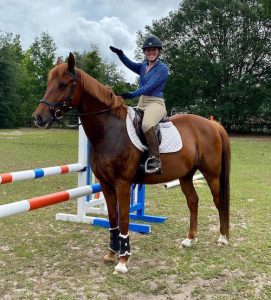
This is such a hard question. I think I would have to go with sushi, tacos and ice cream (have to have something sweet, too).
Note: Some images in this post were taken prior to national guidelines of face coverings and social distancing.
Interested in learning more about the field of nutritional sciences? Read more here and here!
P.S. The Discover FSHN Series highlights the unique experiences of UF’s Food Science and Human Nutrition students, faculty, and staff. Want to read more about the amazing work going on in the FSHN department? See our previous student, faculty, and staff features below:
Undergraduate Students:
Shannon Mai, Dietetics
Alex Colon, Dietetics and Jenny Duong, Food Science
Jackie Shannon, Nutritional Sciences
Jennifer Jordan, Food Science
Graduate Students:
Savanna Curtis, Food Science
Carley Rusch and Matthew Beke, Nutritional Sciences
Alexa Hosey, Dietetics (MS/DI)
Faculty:
Dr. Naim Montazeri, Food Science/Food Virology
Dr. Jeanette Andrade, Dietetics
Dr. Zhiyong Cheng, Nutritional Sciences
Dr. Juan Andrade Laborde, Global Nutrition
Staff:
Sharyn Passeretti, Lab Specialist
P.P.S. Learn more about FSHN’s renowned programs below!
Undergraduate Programs:
Dietetics
Food Science
Nutritional Sciences
Graduate Programs:
M.S. Dietetic Internship Program
M.S. Food Science and Human Nutrition
Ph.D. Food Science
Ph.D. Nutritional Sciences
 1
1
